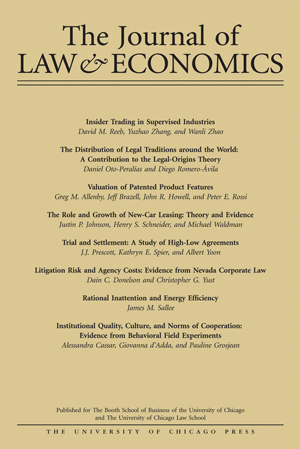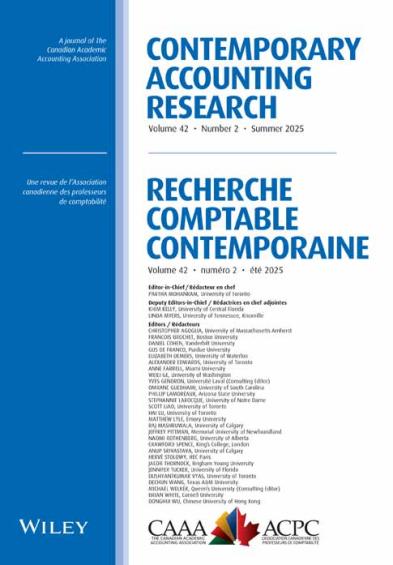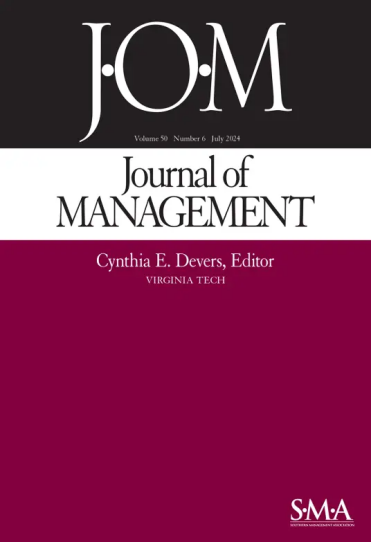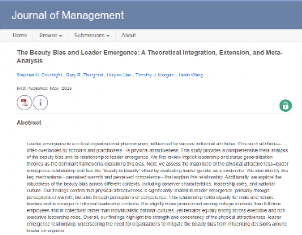Recently, Assistant Professors LI Yongbo, CHEN Xia, and WANG Jiexin from Shenzhen University WeBank Institute of FinTech (SWIFT) have published research papers in internationally renowned journals including the Journal of Law and Economics, Contemporary Accounting Research, and Journal of Management. Among these publications are: one paper in a top-tier journal in law and economics, two papers in Financial Times 50 (FT 50) ranked journals. These accomplishments have significantly bolstered SWIFT’s academic influence across multiple research fields including economics, accounting, and management. They exemplify our institution’s dedication to high-quality research and commitment to advancing interdisciplinary innovation.
Details of the publications are as follows:
Paper 1
Assistant Professor LI Yongbo’s paper titled “Freedom of Expression and Stock Price Crash Risk: Evidence from a Natural Experiment” has been published in the Journal of Law and Economics, as one of the premier journal in the field of law and economics.

Founded in 1958, the Journal of Law and Economics (JLE) publishes research papers on a wide range of topics, including: Economic analysis of law, Economic analysis of regulation and regulated firm behavior, Industrial organization and antitrust policy, Political economy of legislation and legislative processes Law and finance, Corporate finance and governance. The JLE has published numerous highly influential and widely cited articles in these fields.

Abstract: Strategic lawsuits against public participation (SLAPPs) are abused to suppress legitimate free expression and have significant chilling effects. Anti-SLAPP statutes weaken the chilling effects by enabling the courts to quickly dismiss frivolous suits and recover legal costs for defendants. The improved protection of free expression reduces the public’s concerns about revealing bad news about firms, which decreases managers’ abilities and incentives to hide bad news. Using a difference-in-differences approach, we find that the anti-SLAPP statute of a state reduces stock price crash risk for firms headquartered in that state. The effect is stronger when the local public has more information, discovered bad news can be widely disseminated, and managers face a higher cost if withheld bad news is revealed by a third party. Anti-SLAPP statutes increase negativity in the media and decrease earnings management and overinvestment. Our study has policy implications for legislators considering adopting or improving anti-SLAPP laws.
Paper 2
Assistant Professor CHEN Xia has published a research paper titled "Managerial sentiment and short-term operating decisions: Evidence from terrorist attacks" in Contemporary Accounting Research, which is a world-leading academic journal in accounting.

Contemporary Accounting Research, established in 1984 by the Canadian Academic Accounting Association (CAAA), is an internationally renowned top-tier journal in the field of accounting. It covers major research areas including financial accounting, management accounting, auditing, taxation, and corporate governance. The journal is consistently ranked among the top 5 accounting journals globally and is one of the Financial Times 50 (FT 50) ranked journals.

Abstract:Using terrorist attacks and mass shootings as an exogenous source driving psychological changes in managerial sentiment, we explore the causal effect of managerial sentiment on firms' short-term operating decisions. Employing cost stickiness to measure short-term operating decisions on resource allocation and cost control, we find that firms located in the attacked metropolitan areas experience a significant decline in the degree of cost stickiness. We further find that the effect is more pronounced for firms that have inexperienced and less confident CEOs, when attack events are more salient, and when managers have lower prior exposure to negative events in their personal experiences. We also explore inventory management as another form of short-term operating decisions and find that firms exhibit reduced asymmetric inventory management and a lower level of abnormal inventory holdings in postattack periods. Overall, our study suggests that shocks caused by exogenous negative events affect managerial sentiment, which in turn shapes managers' short-term operating decisions.
Paper 3
Assistant Professor WANG Jiexin has published a research paper titled "The Beauty Bias and Leader Emergence: A Theoretical Integration, Extension, and Meta-Analysis" in the Journal of Management, which is an internationally leading academic journal in the field of management.

The Journal of Management is widely regarded as one of the premier academic journals in management and is one of Financial Times 50 (FT 50) ranked journals. Renowned for its rigorous scholarly standards and innovative research, the journal covers core domains including strategic management, organizational behavior, human resource management, international business, entrepreneurship, leadership, and organizational theory. It actively advances cutting-edge management topics and practical applications.

Abstract:Leader emergence is a critical organizational phenomenon, influenced by various individual attributes. One such attribute—often overlooked by scholars and practitioners—is physical attractiveness. This study provides a comprehensive meta-analysis of the beauty bias and its relationship to leader emergence. We first review implicit leadership and status generalization theories as the dominant frameworks explaining this bias. Next, we assess the magnitude of the physical attractiveness–leader emergence relationship and test the “beauty is beastly” effect by evaluating leader gender as a moderator. We also identify two key mechanisms—perceived warmth and perceived competence—that explain this relationship. Additionally, we explore the robustness of the beauty bias across different contexts, including observer characteristics, leadership roles, and national culture. Our findings confirm that physical attractiveness is significantly related to leader emergence, primarily through perceptions of warmth, but also through perceptions of competence. This relationship holds equally for male and female leaders and is stronger in informal leadership contexts. It is slightly more pronounced among college students than full-time employees and in collectivist rather than individualistic national cultures, yet remains equally strong across executive and non-executive leadership roles. Overall, our findings highlight the strength and consistency of the physical attractiveness–leader emergence relationship, underscoring the need for organizations to mitigate the beauty bias from influencing decisions around leader emergence.
Faculty Profiles:

LI Yongbo is an assistant professor at Shenzhen Audencia Financial Technology Institute, Shenzhen University. His research focus on corporate governance, tax planning, and financial reporting. His research has been published in leading international journals including Contemporary Accounting Research, Journal of Accounting and Public Policy, Journal of Corporate Finance, and Journal of Law and Economics.

CHEN Xia is an assistant professor at Shenzhen Audencia Financial Technology Institute, Shenzhen University. Dr. Chen holds a PhD jointly awarded by City University of Hong Kong and Huazhong University of Science and Technology. Her scholarly work appears in top-tier international journals such as Contemporary Accounting Research, Journal of Corporate Finance, European Accounting Review, Emerging Markets Review, Accounting and Finance, and Asia-Pacific Journal of Accounting & Economics.

WANG Jiexin is an assistant professor at Shenzhen Audencia Financial Technology Institute, Shenzhen University. Dr. Wang earned her PhD in Management from Texas A&M University and previously served as an Assistant Professor at The Pennsylvania State University. Her research examines workplace personality, psychology, employee behavior, and well-being, with a focus on how work-family conflict impacts job performance and mental/physical health. She also explores applications of personality psychology in human resource management. Her publications appear in premier journals including the Journal of Personality and Social Psychology, Journal of Applied Psychology, Journal of Management, Human Resource Management Review, Journal of Vocational Behavior, and Management International Review. Dr. Wang chaired sessions at the Asia-Pacific Management Conference and organized symposia on AI applications in management. She has joined in several research grants, such as the National Natural Science Foundation of China (NSFC) and the Guangdong Natural Science Foundation, advancing the integration of traditional and digital management practices while developing organizational solutions for multiple industries.




